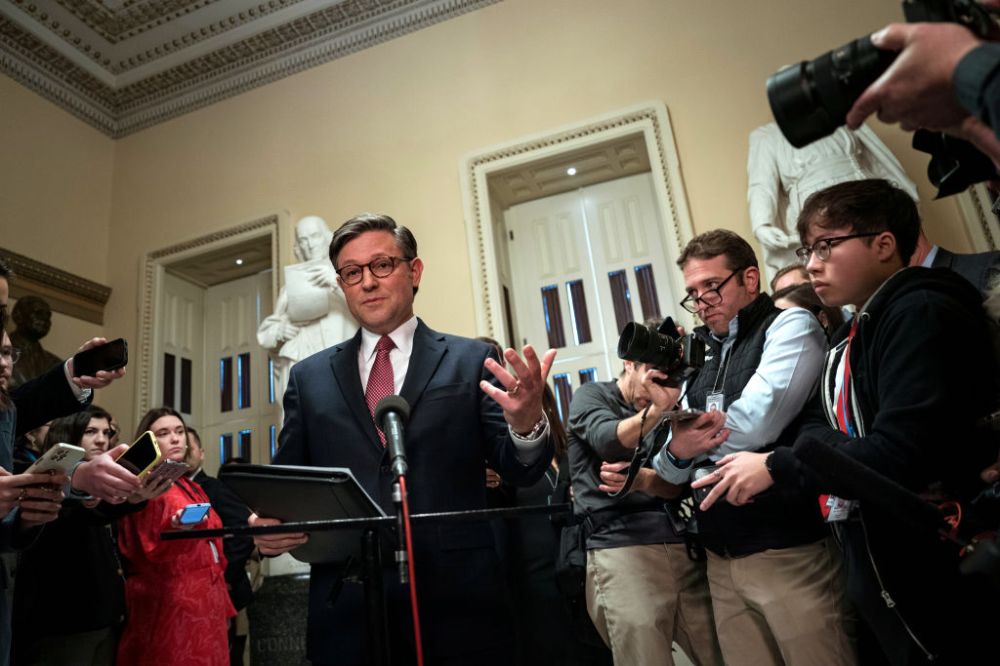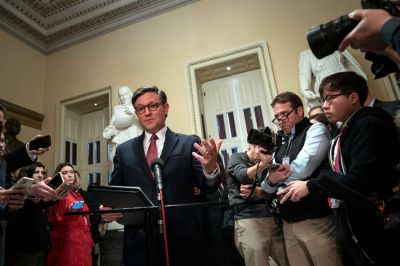I’ve started to talk myself into thinking that new House Speaker Mike Johnson should quit.
Or threaten to quit, at least.
Granted, he’s been on the job less than three months. But that’s ample time for all interested parties to have discovered what any close observer of Congress already knew: The House Republican majority is ungovernable.
A certain sort of grassroots populist Republican insists on believing that all impediments to the right advancing its priorities flow from weak leadership on their own side. If spending isn’t being cut or the border isn’t being sealed, the fault ultimately lies with powerful RINOs too squeamish to practice cutthroat brinkmanship. Fundamentally, they view the world the way a child does: If they’re not getting what they want, it must be because cruel family elders don’t want them to have it.
And so if Kevin McCarthy lets them down in negotiations with Democrats, the problem—and thus, the solution—is obvious.
The fact that this reductionist fantasy is so widespread among the activist right forces populist Republicans in Congress to mirror it, to the party’s detriment. Whether or not the average member of the House Freedom Caucus truly believes that Johnson can bend Joe Biden and Chuck Schumer to his will through sheer determination, there are enough voters back home who believe it to ensure that their next House primaries will be white-knuckle affairs if they don’t pantomime that conviction.
The cost of that fantasy is a House majority that’s come to rely heavily on Democratic help to pass even basic legislation and that owes most of its newsiest headlines to spectacular displays of dissension in its own ranks.
Not quite three months after taking the gavel, Mike Johnson holds arguably the weakest political hand of any speaker in American history. The other party controls the White House and the Senate while his own party enjoys a scant two-seat majority in the House at the moment. Herding congressional cats under those circumstances would be challenging even for a seasoned politician leading a conference unified by ideology, but the new guy is in just his fourth term and has to somehow bridge a populist-conservative divide. Political reality plainly leaves Johnson no choice but to make a series of compromises with Democrats that will disappoint ideologues.
But as I said, Republican retail politics in 2024 caters to fantasy, not reality.
What if the only way to shake his party out of its fantastic stupor is for Johnson to break the gavel over his knee and bolt?
You’re forgiven if you haven’t paid attention to the latest standoff in the House, whether because you’re preoccupied with the Republican presidential race or because you’ve seen this movie before many, many times and grown bored with it.
In brief, Johnson and his conference have somehow arrived at an impasse in which every one of the many options available to them—a shutdown, a partial shutdown, a short-term continuing resolution, a long-term continuing resolution, a compromise with Democrats on spending—is destined to make some meaningful faction of House Republicans lose their minds.
It began last weekend when Johnson and Senate Majority Leader Chuck Schumer announced they’d come to terms on a topline number for federal spending this year: $1.59 trillion (or is it $1.66 trillion?), with appropriators on both sides of the Capitol now tasked with divvying up that pot of money among government departments. The deal was based on the Fiscal Responsibility Act (FRA) that Kevin McCarthy negotiated with Schumer and the White House last year. Johnson got Democrats to agree to a few token tweaks to the FRA—clawing back a bit of COVID relief spending and accelerating cuts to the IRS’ budget—but otherwise the substance didn’t differ much from the terms of the bargain that eventually sent his predecessor into early retirement.
McCarthy noticed. “The deal is my deal,” he told the Financial Times of Johnson’s agreement with Schumer, laughing at the irony. His old enemies in the House Freedom Caucus noticed too. “Total failure,” they dubbed the new topline number in a statement issued afterward.
Everything, or nearly everything, that happened afterward was predictable.
Fiscal hawks demanded a meeting with the speaker to chew him out for not “fighting” harder. Chip Roy made the rounds of populist media outlets, thundering about a potential effort to oust Johnson from his new office. Some members groused that he never should have been chosen for McCarthy’s job to begin with. Meanwhile, grassroots activists did what grassroots activists do:
All of that spooked House Republicans from swing districts into seeking their own meeting with the speaker, fearful of potential outcomes to this saga that might damage their chances at reelection. This time it’s not just a shutdown that they’re worried about: If the deal between Johnson and Schumer were to fall apart, the FRA would trigger an automatic 1 percent cut to defense spending this year and potentially a 9 percent cut to domestic programs. The latter would be potent material for Democratic admakers.
At last check this morning, Johnson was getting chewed out again by Freedom Caucus members, this time on the House floor. To show him that they mean business (maybe? sort of?), on Wednesday they embarrassed the speaker publicly by defeating a rule to open floor debate. Traditionally, rule votes have always, always been carried by the majority; in this Congress, it’s become almost routine for House Republicans to spite their leadership by blocking them.
It’s an absurd situation. But do you appreciate how truly absurd it is?
Consider the following.
After Johnson worked with lawmakers to pass a short-term funding bill last fall to avert a government shutdown shortly after securing the speaker’s gavel, he swore that he would never do so again. No more lazy budgetary can-kicking for this Congress; the new era of serious, far-sighted budgeting had begun. As things stand today, we’re a week out from that last funding bill expiring with zero chance of appropriators in both chambers reaching agreement on long-term spending in the coming days. Johnson and his conference are already all but assured to break his promise by approving another stopgap measure.
Next, for all of the bravado from Roy and other fiscal conservatives about snatching his gavel away, a sudden leadership vacuum in the House right now would inevitably create a bigger fiasco than the one that followed McCarthy’s ouster in October. Johnson’s rapid departure would prove that no one can effectively lead the Republican majority; it’s frankly anyone’s guess if any member can secure 218 votes at this point, especially with moderates seething at conservatives for wanting to dump the new guy after less than three months. Imagine the conference being paralyzed for many weeks—again—as deadlines to fund the government and approve new aid for Ukraine lapse.
Finally, as ever, the two wings of the party are bickering over something that’s ultimately inconsequential. If fiscal hawks were playing hardball to gain leverage for meaningful reforms, like changes to Medicare and Social Security, that might restore the sustainability of spending long-term, one could argue that brinkmanship was worth the risk of an electoral backlash. As it is, the theatrical sturm und drang over whether the budget topline ends up being $1.6 trillion or merely $1.5 trillion feels like a cosmic joke, a ludicrous kabuki of “fighting” for an important principle.
It was all predictable, right down to Johnson’s enemies in the conference seizing the opportunity to make bespoke demands of him involving Ukraine and border security. At one point, the speaker reportedly told fiscal hawks that he’d prefer to scrap his agreement with Schumer and simply let the cuts in the FRA take effect—only to then be warned by defense hawks that they won’t support a bill that doesn’t boost funding for the Pentagon.
It was all predictable. Except, as I said earlier, for one thing:
The surprising part isn’t that Johnson ended up resisting pressure from the Freedom Caucus, or that the usual suspects would immediately start whining about it. The surprising part is that he actually let it be known at one point that he was considering reneging on the deal.
I don’t know why he’d do that, as it weakened his credibility on all sides. Had he ended up being bullied into changing his mind, neither Senate Democrats nor the White House would ever again have taken him seriously in negotiations, fearing that he might get muscled after the fact by Chip Roy. And meanwhile, he gave the fiscal hawks around him false hope, dangling the possibility that he’d tear up his agreement with Schumer only to eventually disappoint them by refusing. He gained nothing by wavering publicly.
And so here’s where we are as of Friday afternoon.
Neither Johnson nor any other Republican wanted a short-term continuing resolution to keep the government funded while appropriators do their work, yet somehow they’re going to saddle themselves with one. Neither he nor any other Republican wants another speaker vacancy after the black eye the party received from the last one either, but they might saddle themselves with one of those too. The Freedom Caucus may feel obliged to go nuclear lest it look to their populist fan base like they lost a staring contest with the wimpy new speaker.
One can’t help but think that Kevin McCarthy wasn’t ultimately the problem here.
Should Mike Johnson walk away?
I don’t mean for the sake of his mental health, although his mental health would doubtless improve upon being paroled from this job. I mean to teach his conference a lesson.
If the populists want chaos, give ‘em a hard dose of it. Force a leadership vacuum on them and let them reap the political consequences. At some point, one would hope, this circus will look so ridiculous even to the clowns participating in it that they’ll drop the brinkmanship and infighting and make a show of governing responsibly.
Johnson would be doing a good deed for his party and his country in the long run by showing the world that Kevin McCarthy was never the problem.
On the other hand, there’s a case to be made that he doesn’t need to walk away to chastise the Freedom Caucus. This latest episode may have already done it. The Chip Roys will huff and puff next week about the speaker selling out to Chuck Schumer, but I doubt they’ll have the nerve to trigger another leadership vacancy with elections less than 10 months away. As much as they relish posturing romantically against “the establishment,” another spectacle showcasing their willingness to decapitate their own leadership would reduce them to petulant laughingstocks. This time, I suspect, their sound and fury signifies nothing.
And Johnson knows it, which is why he felt safe defying them in the end. If he wants his conference to behave better going forward, maybe he should privately threaten to quit and force laughingstock status on them unless they at least start supporting rule votes to advance legislation the way majorities traditionally have.
There’s a third possibility. Do populists in this conference truly want to govern?
The point of politics—ostensibly—is to gain power and implement policies that you believe improve the country. That being so, the idea that a political faction might prefer not to be in the majority seems ludicrous. It’d be aptly described as anti-politics.
“Anti-politics” feels like the right word to describe the perverse incentives of populist right-wing political culture, though. Why, it was just a few months ago that a member of the House Republican conference admitted he wished his party hadn’t done as well in the 2022 midterms as it did. That was Matt Rosendale, who reasoned that a very narrow GOP majority was preferable to a sizable one because it would give populists more leverage over legislation. In theory.
In practice, what it does is relegate the majority to de facto minority status. Digest this graphic from Axios:

Last month, lobbyist Liam Donovan marveled at how heavily House Republican leaders have come to rely on “suspension of the rules” to get major legislation passed, including the short-term funding bill that averted a government shutdown last November. Historically, suspension has been used to speed up the process of passing uncontroversial bills, dispensing with procedural formalities provided that a two-thirds majority instead of the usual 218 support the underlying legislation.
But because the House GOP majority is so narrow, and because so many Rosendale types in the conference are willing to block efforts by their own leadership to move certain bills on the floor, Johnson is left with no choice but to use suspension to go around them. The speaker is essentially leading a bipartisan coalition of Democrats and moderate Republicans, with populist Republicans—the activist heart of his party’s base—relegated to a minority.
And maybe that’s the way they want it. In Trump’s Republican party, the only way to prove one’s populist authenticity is to lose power. RINO sellouts like Mike Johnson might be willing to work with Chuck Schumer to pass laws, but the fighters of the Freedom Caucus refuse to stoop to doing so. The very fact of their disempowerment proves that they’re not of the hated establishment, which, in anti-politics, is more important than governing.
One wonders if that logic hasn’t also infected the Republican presidential primary, where a guy who lost the presidency the last time he ran, lost the popular vote both times he ran, and saw his party lose the House and Senate during his term is running away with the race. The establishment wouldn’t have conspired to defeat Trump so many times if it didn’t fear him.
House populists might quietly be fine with their de facto minority status, then. And if I’m wrong about their willingness to oust Johnson, they might prove equally comfortable with a power-sharing deal once he’s gone between House Democrats and the most centrist members of the Republican conference. Nothing would prevent a small clutch of GOP moderates from replacing him by uniting with the Democratic caucus and governing from the center, marginalizing the rest of the House GOP.
Imagine being so intractable in your political demands for the sake of demonstrating your ideological purity that your party ends up effectively losing control of the House mid-term. That would be the most embarrassing populist-driven disempowerment ever, and therefore, in a way, populists’ greatest victory.
Ultimately, the childish grassroots fantasy I described earlier in which “weak” Republican leaders are to blame for all of America’s problems aims to treat all bipartisan compromise as inherently illegitimate. Which makes sense: If the point of anti-politics isn’t to advance a policy agenda so much as to oppose whatever agenda the enemy is advancing, then all compromise really is illegitimate. It doesn’t matter what Democrats are asking for; I doubt, for instance, that Charlie Kirk could explain in any depth what he finds so reprehensible about Johnson’s deal with Schumer. All that matters is that Democrats asked for it and the speaker agreed. By doing so, he’s tainted ineffably.
Anti-politics is about lib-owning, not governing. You can do that just as well from the minority as from the majority, if not better.







Please note that we at The Dispatch hold ourselves, our work, and our commenters to a higher standard than other places on the internet. We welcome comments that foster genuine debate or discussion—including comments critical of us or our work—but responses that include ad hominem attacks on fellow Dispatch members or are intended to stoke fear and anger may be moderated.
With your membership, you only have the ability to comment on The Morning Dispatch articles. Consider upgrading to join the conversation everywhere.